Xiaoxiao Li
AgentArk: Distilling Multi-Agent Intelligence into a Single LLM Agent
Feb 03, 2026Abstract:While large language model (LLM) multi-agent systems achieve superior reasoning performance through iterative debate, practical deployment is limited by their high computational cost and error propagation. This paper proposes AgentArk, a novel framework to distill multi-agent dynamics into the weights of a single model, effectively transforming explicit test-time interactions into implicit model capabilities. This equips a single agent with the intelligence of multi-agent systems while remaining computationally efficient. Specifically, we investigate three hierarchical distillation strategies across various models, tasks, scaling, and scenarios: reasoning-enhanced fine-tuning; trajectory-based augmentation; and process-aware distillation. By shifting the burden of computation from inference to training, the distilled models preserve the efficiency of one agent while exhibiting strong reasoning and self-correction performance of multiple agents. They further demonstrate enhanced robustness and generalization across diverse reasoning tasks. We hope this work can shed light on future research on efficient and robust multi-agent development. Our code is at https://github.com/AIFrontierLab/AgentArk.
Rethinking LoRA for Data Heterogeneous Federated Learning: Subspace and State Alignment
Feb 02, 2026Abstract:Low-Rank Adaptation (LoRA) is widely used for federated fine-tuning. Yet under non-IID settings, it can substantially underperform full-parameter fine-tuning. Through with-high-probability robustness analysis, we uncover that this gap can be attributed to two coupled mismatches: (i) update-space mismatch, where clients optimize in a low-rank subspace but aggregation occurs in the full space; and (ii) optimizer-state mismatch, where unsynchronized adaptive states amplify drift across rounds. We propose FedGaLore, which combines client-side GaLore-style gradient-subspace optimization with server-side drift-robust synchronization of projected second-moment states via spectral shared-signal extraction, to address this challenge. Across NLU, vision, and NLG benchmarks, FedGaLore improves robustness and accuracy over state-of-the-art federated LoRA baselines in non-IID settings.
RVCBench: Benchmarking the Robustness of Voice Cloning Across Modern Audio Generation Models
Jan 31, 2026Abstract:Modern voice cloning (VC) can synthesize speech that closely matches a target speaker from only seconds of reference audio, enabling applications such as personalized speech interfaces and dubbing. In practical deployments, modern audio generation models inevitably encounter noisy reference audios, imperfect text prompts, and diverse downstream processing, which can significantly hurt robustness. Despite rapid progress in VC driven by autoregressive codec-token language models and diffusion-based models, robustness under realistic deployment shifts remains underexplored. This paper introduces RVCBench, a comprehensive benchmark that evaluates Robustness in VC across the full generation pipeline, including input variation, generation challenges, output post-processing, and adversarial perturbations, covering 10 robustness tasks, 225 speakers, 14,370 utterances, and 11 representative modern VC models. Our evaluation uncovers substantial robustness gaps in VC: performance can deteriorate sharply under common input shifts and post-processing; long-context and cross-lingual scenarios further expose stability limitations; and both passive noise and proactive perturbation influence generation robustness. Collectively, these findings provide a unified picture of how current VC models fail in practice and introduce a standardized, open-source testbed to support the development of more robust and deployable VC models. We open-source our project at https://github.com/Nanboy-Ronan/RVCBench.
When RAG Hurts: Diagnosing and Mitigating Attention Distraction in Retrieval-Augmented LVLMs
Jan 30, 2026Abstract:While Retrieval-Augmented Generation (RAG) is one of the dominant paradigms for enhancing Large Vision-Language Models (LVLMs) on knowledge-based VQA tasks, recent work attributes RAG failures to insufficient attention towards the retrieved context, proposing to reduce the attention allocated to image tokens. In this work, we identify a distinct failure mode that previous study overlooked: Attention Distraction (AD). When the retrieved context is sufficient (highly relevant or including the correct answer), the retrieved text suppresses the visual attention globally, and the attention on image tokens shifts away from question-relevant regions. This leads to failures on questions the model could originally answer correctly without the retrieved text. To mitigate this issue, we propose MAD-RAG, a training-free intervention that decouples visual grounding from context integration through a dual-question formulation, combined with attention mixing to preserve image-conditioned evidence. Extensive experiments on OK-VQA, E-VQA, and InfoSeek demonstrate that MAD-RAG consistently outperforms existing baselines across different model families, yielding absolute gains of up to 4.76%, 9.20%, and 6.18% over the vanilla RAG baseline. Notably, MAD-RAG rectifies up to 74.68% of failure cases with negligible computational overhead.
A Federated and Parameter-Efficient Framework for Large Language Model Training in Medicine
Jan 29, 2026Abstract:Large language models (LLMs) have demonstrated strong performance on medical benchmarks, including question answering and diagnosis. To enable their use in clinical settings, LLMs are typically further adapted through continued pretraining or post-training using clinical data. However, most medical LLMs are trained on data from a single institution, which faces limitations in generalizability and safety in heterogeneous systems. Federated learning (FL) is a promising solution for enabling collaborative model development across healthcare institutions. Yet applying FL to LLMs in medicine remains fundamentally limited. First, conventional FL requires transmitting the full model during each communication round, which becomes impractical for multi-billion-parameter LLMs given the limited computational resources. Second, many FL algorithms implicitly assume data homogeneity, whereas real-world clinical data are highly heterogeneous across patients, diseases, and institutional practices. We introduce the model-agnostic and parameter-efficient federated learning framework for adapting LLMs to medical applications. Fed-MedLoRA transmits only low-rank adapter parameters, reducing communication and computation overhead, while Fed-MedLoRA+ further incorporates adaptive, data-aware aggregation to improve convergence under cross-site heterogeneity. We apply the framework to clinical information extraction (IE), which transforms patient narratives into structured medical entities and relations. Accuracy was assessed across five patient cohorts through comparisons with BERT models, and LLaMA-3 and DeepSeek-R1, GPT-4o models. Evaluation settings included (1) in-domain training and testing, (2) external validation on independent cohorts, and (3) a low-resource new-site adaptation scenario using real-world clinical notes from the Yale New Haven Health System.
Textual Equilibrium Propagation for Deep Compound AI Systems
Jan 28, 2026Abstract:Large language models (LLMs) are increasingly deployed as part of compound AI systems that coordinate multiple modules (e.g., retrievers, tools, verifiers) over long-horizon workflows. Recent approaches that propagate textual feedback globally (e.g., TextGrad) make it feasible to optimize such pipelines, but we find that performance degrades as system depth grows. In particular, long-horizon agentic workflows exhibit two depth-scaling failure modes: 1) exploding textual gradient, where textual feedback grows exponentially with depth, leading to prohibitively long message and amplifies evaluation biases; and 2) vanishing textual gradient, where limited long-context ability causes models overemphasize partial feedback and compression of lengthy feedback causes downstream messages to lose specificity gradually as they propagate many hops upstream. To mitigate these issues, we introduce Textual Equilibrium Propagation (TEP), a local learning principle inspired by Equilibrium Propagation in energy-based models. TEP includes two phases: 1) a free phase where a local LLM critics iteratively refine prompts until reaching equilibrium (no further improvements are suggested); and 2) a nudged phase which applies proximal prompt edits with bounded modification intensity, using task-level objectives that propagate via forward signaling rather than backward feedback chains. This design supports local prompt optimization followed by controlled adaptation toward global goals without the computational burden and signal degradation of global textual backpropagation. Across long-horizon QA benchmarks and multi-agent tool-use dataset, TEP consistently improves accuracy and efficiency over global propagation methods such as TextGrad. The gains grows with depth, while preserving the practicality of black-box LLM components in deep compound AI system.
When Single-Agent with Skills Replace Multi-Agent Systems and When They Fail
Jan 08, 2026Abstract:Multi-agent AI systems have proven effective for complex reasoning. These systems are compounded by specialized agents, which collaborate through explicit communication, but incur substantial computational overhead. A natural question arises: can we achieve similar modularity benefits with a single agent that selects from a library of skills? We explore this question by viewing skills as internalized agent behaviors. From this perspective, a multi-agent system can be compiled into an equivalent single-agent system, trading inter-agent communication for skill selection. Our preliminary experiments suggest this approach can substantially reduce token usage and latency while maintaining competitive accuracy on reasoning benchmarks. However, this efficiency raises a deeper question that has received little attention: how does skill selection scale as libraries grow? Drawing on principles from cognitive science, we propose that LLM skill selection exhibits bounded capacity analogous to human decision-making. We investigate the scaling behavior of skill selection and observe a striking pattern. Rather than degrading gradually, selection accuracy remains stable up to a critical library size, then drops sharply, indicating a phase transition reminiscent of capacity limits in human cognition. Furthermore, we find evidence that semantic confusability among similar skills, rather than library size alone, plays a central role in this degradation. This perspective suggests that hierarchical organization, which has long helped humans manage complex choices, may similarly benefit AI systems. Our initial results with hierarchical routing support this hypothesis. This work opens new questions about the fundamental limits of semantic-based skill selection in LLMs and offers a cognitive-grounded framework and practical guidelines for designing scalable skill-based agents.
HookMIL: Revisiting Context Modeling in Multiple Instance Learning for Computational Pathology
Dec 20, 2025Abstract:Multiple Instance Learning (MIL) has enabled weakly supervised analysis of whole-slide images (WSIs) in computational pathology. However, traditional MIL approaches often lose crucial contextual information, while transformer-based variants, though more expressive, suffer from quadratic complexity and redundant computations. To address these limitations, we propose HookMIL, a context-aware and computationally efficient MIL framework that leverages compact, learnable hook tokens for structured contextual aggregation. These tokens can be initialized from (i) key-patch visual features, (ii) text embeddings from vision-language pathology models, and (iii) spatially grounded features from spatial transcriptomics-vision models. This multimodal initialization enables Hook Tokens to incorporate rich textual and spatial priors, accelerating convergence and enhancing representation quality. During training, Hook tokens interact with instances through bidirectional attention with linear complexity. To further promote specialization, we introduce a Hook Diversity Loss that encourages each token to focus on distinct histopathological patterns. Additionally, a hook-to-hook communication mechanism refines contextual interactions while minimizing redundancy. Extensive experiments on four public pathology datasets demonstrate that HookMIL achieves state-of-the-art performance, with improved computational efficiency and interpretability. Codes are available at https://github.com/lingxitong/HookMIL.
A Closer Look at Personalized Fine-Tuning in Heterogeneous Federated Learning
Nov 16, 2025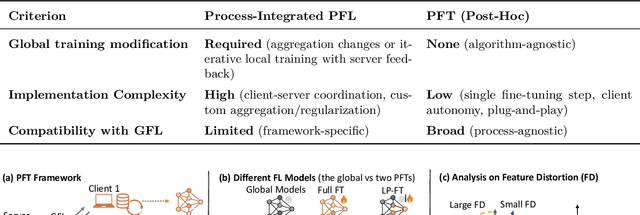


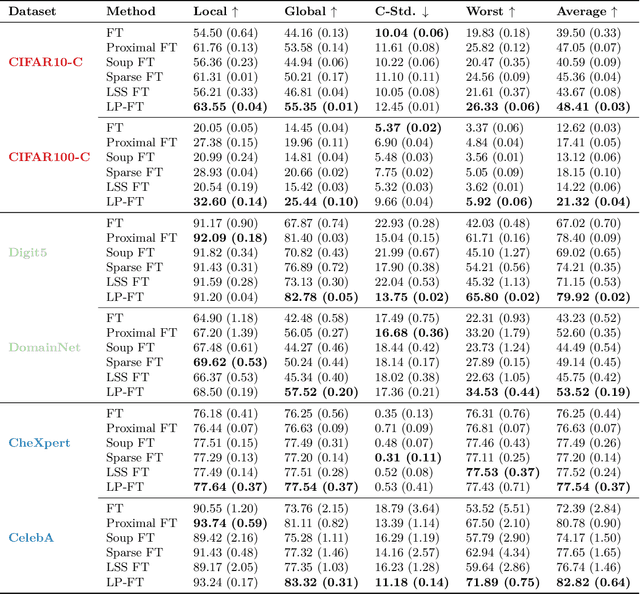
Abstract:Federated Learning (FL) enables decentralized, privacy-preserving model training but struggles to balance global generalization and local personalization due to non-identical data distributions across clients. Personalized Fine-Tuning (PFT), a popular post-hoc solution, fine-tunes the final global model locally but often overfits to skewed client distributions or fails under domain shifts. We propose adapting Linear Probing followed by full Fine-Tuning (LP-FT), a principled centralized strategy for alleviating feature distortion (Kumar et al., 2022), to the FL setting. Through systematic evaluation across seven datasets and six PFT variants, we demonstrate LP-FT's superiority in balancing personalization and generalization. Our analysis uncovers federated feature distortion, a phenomenon where local fine-tuning destabilizes globally learned features, and theoretically characterizes how LP-FT mitigates this via phased parameter updates. We further establish conditions (e.g., partial feature overlap, covariate-concept shift) under which LP-FT outperforms standard fine-tuning, offering actionable guidelines for deploying robust personalization in FL.
Efficient Forward-Only Data Valuation for Pretrained LLMs and VLMs
Aug 13, 2025
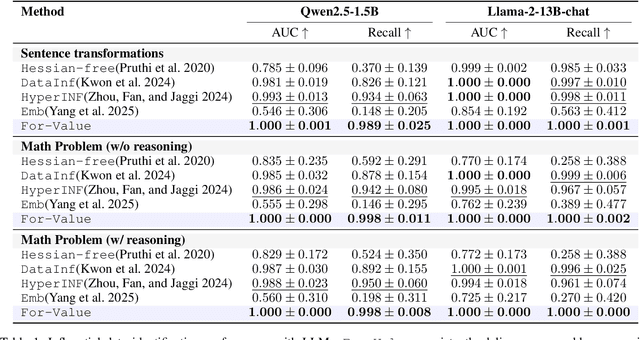
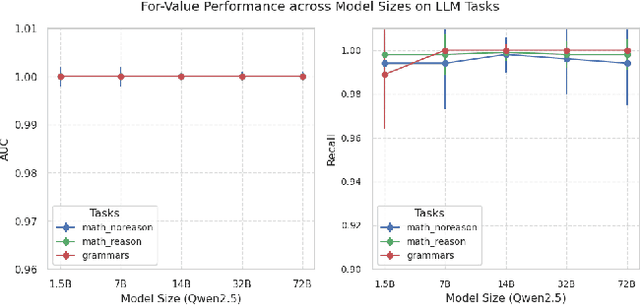
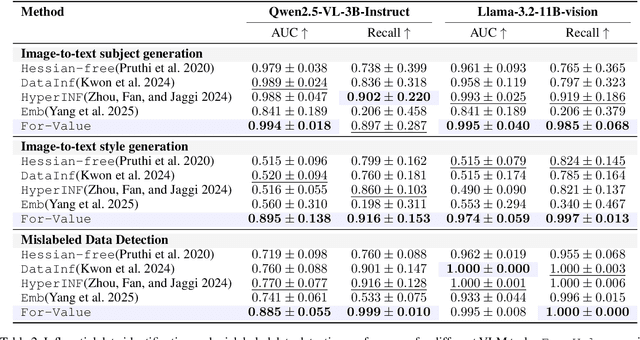
Abstract:Quantifying the influence of individual training samples is essential for enhancing the transparency and accountability of large language models (LLMs) and vision-language models (VLMs). However, existing data valuation methods often rely on Hessian information or model retraining, making them computationally prohibitive for billion-parameter models. In this work, we introduce For-Value, a forward-only data valuation framework that enables scalable and efficient influence estimation for both LLMs and VLMs. By leveraging the rich representations of modern foundation models, For-Value computes influence scores using a simple closed-form expression based solely on a single forward pass, thereby eliminating the need for costly gradient computations. Our theoretical analysis demonstrates that For-Value accurately estimates per-sample influence by capturing alignment in hidden representations and prediction errors between training and validation samples. Extensive experiments show that For-Value matches or outperforms gradient-based baselines in identifying impactful fine-tuning examples and effectively detecting mislabeled data.
 Add to Chrome
Add to Chrome Add to Firefox
Add to Firefox Add to Edge
Add to Edge